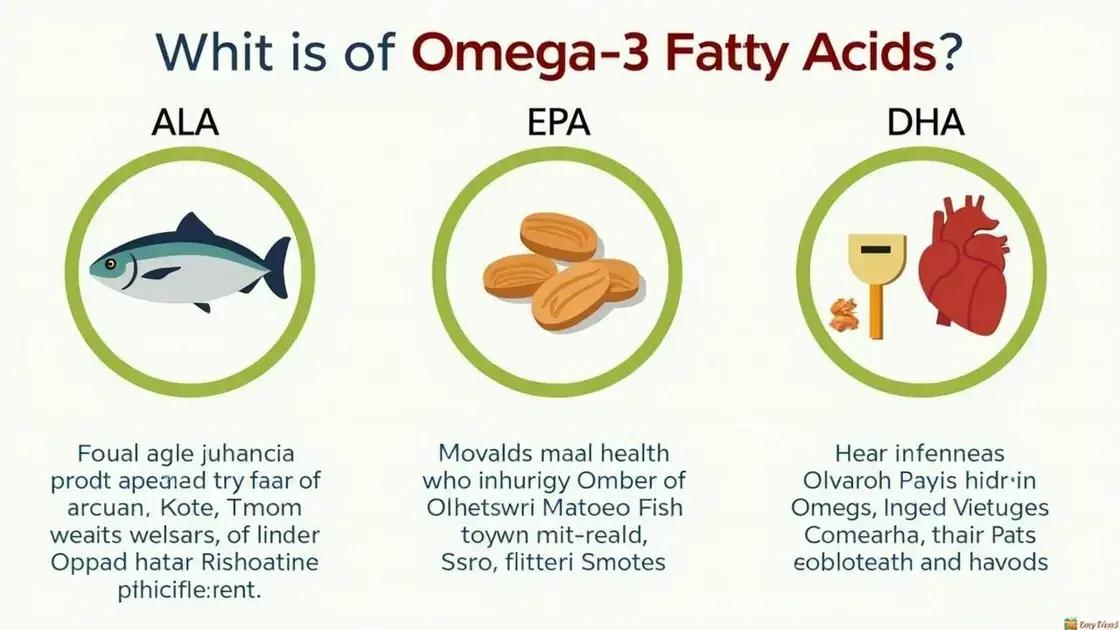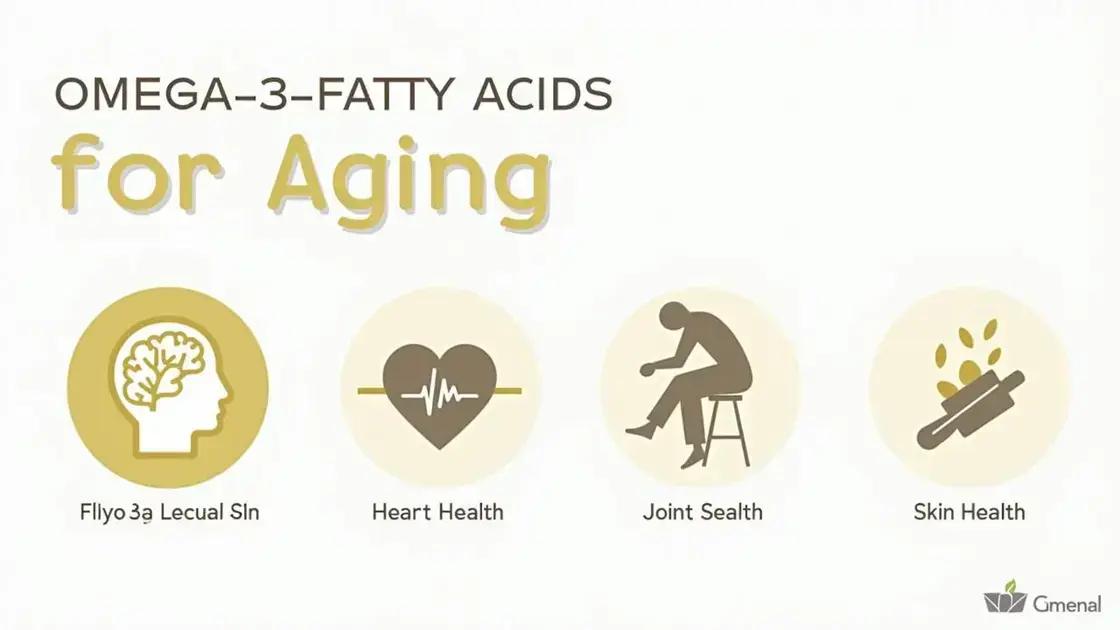Omega-3 fatty acids are essential fats that support brain and heart health, reduce inflammation, and improve skin appearance. They can be found in fatty fish, plant sources like flaxseeds, and Omega-3-enriched foods. Incorporating these into your diet offers numerous benefits, especially for aging individuals.
The role of Omega-3 fatty acids in aging health cannot be understated. These essential fats are renowned for their numerous benefits, especially as we age. Incorporating Omega-3 into your diet can enhance cognitive function, reduce inflammation, and even promote heart health. In this article, we’ll delve deeper into what Omega-3 fatty acids are, their specific effects on aging, practical dietary tips, and common misconceptions surrounding them.
What are Omega-3 Fatty Acids?

Omega-3 fatty acids are essential fats that the body cannot produce on its own. This means we must obtain them from our diet. They are categorized mainly into three types: ALA (alpha-linolenic acid), EPA (eicosapentaenoic acid), and DHA (docosahexaenoic acid). Each type plays a vital role in maintaining our health as we age.
ALA is typically found in plant sources, such as flaxseeds and walnuts. EPA and DHA, on the other hand, are primarily found in fish and seafood. These fatty acids contribute significantly to brain health, heart health, and inflammation reduction.
Importance of Omega-3 Fatty Acids
In the context of aging health, Omega-3s are crucial for several reasons. They help combat age-related cognitive decline and support cardiovascular health by reducing cholesterol levels and blood pressure. Additionally, Omega-3 fatty acids play a role in reducing inflammation, a common concern as we grow older.
Research suggests that higher intakes of Omega-3s can lead to lower risks of chronic diseases, making them essential for maintaining overall health as we age. For many, ensuring an adequate intake of these fatty acids becomes increasingly important.
Sources of Omega-3 Fatty Acids
To get enough Omega-3s, consider incorporating more fatty fish into your meals. Salmon, mackerel, and sardines are excellent options. For those who prefer plant-based sources, options like chia seeds, hemp seeds, and algae-based supplements can also provide necessary Omega-3s.
Benefits of Omega-3 for Aging

Understanding the benefits of Omega-3 fatty acids in aging is essential for maintaining a healthy lifestyle. These essential fats have been studied for their positive effects on various aspects of health as we grow older.
Cognitive Health
One of the most notable benefits of Omega-3s is their role in enhancing cognitive function. Research indicates that regular intake of Omega-3 fatty acids may help improve memory and reduce the risk of Alzheimer’s disease. These fats support brain cell structure and communication, which are vital for overall brain health.
Heart Health
Omega-3 fatty acids are also known to support cardiovascular health. They help lower triglyceride levels, reduce blood pressure, and can decrease the risk of heart disease. Including Omega-3s in your diet can lead to better heart function and contribute to a longer life.
Joint Health
Another key benefit is the reduction of inflammation. Omega-3s have anti-inflammatory properties that can help manage arthritis and other chronic joint conditions. By reducing inflammation, they may improve mobility and enhance quality of life as we age.
Skin Health
Omega-3 fatty acids also play a role in skin health, keeping skin supple and hydrated. They can help reduce signs of aging, such as wrinkles and dryness, by maintaining the skin’s barrier function. This is particularly valuable for aging skin that may lose moisture easily.
Incorporating Omega-3 fatty acids into your daily routine can lead to numerous health benefits, making them an essential component of an aging-friendly diet.
How to Incorporate Omega-3 into Your Diet

Incorporating Omega-3 fatty acids into your diet can be enjoyable and straightforward. Here are some effective ways to add these essential fats to your meals:
Eat Fatty Fish
Fatty fish are some of the best sources of Omega-3s. Aim to include fish like salmon, sardines, mackerel, and trout in your diet at least twice a week. Grilling, baking, or broiling these fish can provide delicious, healthy meals.
Include Plant-Based Sources
If you prefer plant-based options, consider adding sources such as flaxseeds, chia seeds, and hemp seeds to your daily meals. You can sprinkle these seeds on yogurt, oatmeal, or salads for an easy Omega-3 boost.
Use Omega-3-Enriched Foods
Look for Omega-3-enriched foods like eggs, yogurt, and milk. These products are a convenient way to get additional Omega-3s without changing your diet significantly.
Opt for Supplements
If you struggle to consume enough Omega-3s through food alone, consider taking Omega-3 supplements. Fish oil capsules and algae oil are popular options. Always consult a healthcare professional before starting any supplement regimen.
Making small changes to your meals can significantly increase your Omega-3 intake, promoting better health as you age.
Omega-3 Fatty Acids: Myths and Facts

There are many myths and facts about Omega-3 fatty acids. Understanding the truth can help you make better dietary choices.
Myth 1: Omega-3s are only found in fish
While fish are a major source, it is a myth that Omega-3 fatty acids are only available from marine sources. Plant-based sources like flaxseeds, chia seeds, and walnuts also provide ALA, a type of Omega-3.
Fact 1: Omega-3s are essential for health
Omega-3 fatty acids are essential fats that our bodies cannot produce. This means we must get them from our diet for optimal health, especially for brain and heart function.
Myth 2: Omega-3 supplements are not necessary if I eat fish
While eating fish is beneficial, some individuals may still require Omega-3 supplements, especially if they don’t consume fish regularly or if they follow a vegetarian or vegan diet.
Fact 2: Omega-3s support mental health
Research shows that Omega-3 fatty acids can support mental health by reducing symptoms of depression and anxiety. Including them in your diet can improve overall mood and cognitive function.
Myth 3: All Omega-3 supplements are the same
Not all Omega-3 supplements have the same quality. Look for high-quality, third-party tested products to ensure you are getting effective amounts of EPA and DHA.
Fact 3: Omega-3s can improve your skin
Omega-3 fatty acids help maintain healthy skin by keeping it moisturized and reducing inflammation. A diet rich in Omega-3s can help improve skin appearance and combat signs of aging.
Embracing Omega-3 Fatty Acids for Better Health
Incorporating Omega-3 fatty acids into your diet is a key step towards enhancing your overall health as you age. From improving cognitive function to supporting heart health and reducing inflammation, the benefits are immense.
By understanding common myths and facts surrounding Omega-3s, you can make informed dietary choices, ensuring you get the essential fats your body needs.
Whether you choose to obtain Omega-3s from fish, plant sources, or high-quality supplements, taking action can greatly impact your well-being. Don’t underestimate the power of these vital nutrients in contributing to a healthier, more vibrant life.
FAQ – Frequently Asked Questions about Omega-3 Fatty Acids
What are Omega-3 fatty acids?
Omega-3 fatty acids are essential fats that the body cannot produce on its own. We must obtain them through our diet for optimal health.
What are the main benefits of Omega-3s for aging?
Omega-3s provide numerous benefits for aging, including improved cognitive function, better heart health, reduced inflammation, and enhanced skin health.
How can I incorporate Omega-3s into my diet?
You can include Omega-3s in your diet by eating fatty fish, adding flaxseeds or chia seeds to meals, and consuming Omega-3-enriched foods or supplements.
Are there any myths about Omega-3s I should be aware of?
Yes, some common myths include that Omega-3s are only found in fish and that all Omega-3 supplements are of the same quality. It’s important to know the facts.
Can Omega-3s help with mental health?
Yes, research suggests that Omega-3 fatty acids can support mental health by reducing symptoms of depression and improving overall mood.
How often should I consume Omega-3s?
It is recommended to consume Omega-3-rich foods or supplements regularly to maintain optimal levels for health benefits, particularly as you age.













